
Person Refuses To Put Up With Neighbor’s Kid After One Of The Balls He’s Constantly Kicking Over The Fence Hits Their Puppy
Your home is your castle. Unless your neighbor’s kid is a spoiled prince who disregards other people’s — and, in this case, animals’ — well-being.
Recently, a Redditor and probably a Harry Potter fan who goes online by the nickname Slytherin_90 submitted a story to the popular ‘Am I the [Jerk]?’ community, asking its members to help them make sense of a particularly frustrating situation.
The Redditor’s backyard is getting filled with balls and toys, and the kid on the opposite side of the fence can’t seem to stop. It got so bad that even their dog has developed anxiety. So the Redditor stopped giving the stuff back.
Image credits: Kampus Production (not the actual photo)
Image credits: Helena Lopes (not the actual photo)
There’s a saying that goes “love thy neighbor as yourself,” but clearly not everyone has heard it.
In fact, according to one study on people’s relationships with their neighbors, over a third (36 percent) have had issues that escalate into full-blown arguments, with a quarter stating that they have a long-running feud with someone living next to them.
Many of those polled should be able to relate to the couple who had to endure the lawn mower, as the research commissioned discovered the most common reasons for an argument are over parking, followed closely by animal noise, and noise in general.
After the story went viral, the original poster (OP) provided more information on the issue
The data might explain why over 40 percent of Americans try to avoid their errant neighbors intentionally, with Northeast folks more than twice as likely to say their neighbors are rude when compared to the Southwest.
However, it’s worth mentioning that the biggest reason for said avoidance is simply not having the time to stop and chat.
But thinking the people next door are weird, and not getting along with them, or feeling they are too nosy are common reasons many avoid interaction as well.
And most people thought they weren’t doing anything wrong by keeping the balls and toys
Nearly a quarter (23 percent) say they have neighbors who they consider as friends, and 3 in 10 trust their neighbors a lot, while 86 percent rate themselves as either a good or very good neighbor.
However, this story does illustrate a somewhat counterintuitive reality. While a common stereotype suggests people who live in busy urban areas tend to be less respectful of those around them, the results of the survey reveal the opposite: city people are almost twice as likely to regularly hang out with their neighbors.
Some, however, said that they should just let the kid play
528Kviews
Share on FacebookF**k those that said the OP was an a*****e for not letting the child "play" ... that's not playing ... that's enabling entitled behavior when you can't respect another person's property and living ...
This! It’s one thing if the homeowner has no problem with it. But ASK FIRST! Don’t ever think you can force someone to must put up with anything on their own property. You can kick your footballs anywhere you want in your own yard. But once that football lands in my yard and bothers me—-especially if it hurts or traumatizes my child(ren) or pet(s)—-that football is now MINE. Same as if you gave it to me. You ain’t gettin’ it back.
Load More Replies...My nephew (6) always ended up kicking his footballs into his neighbour's garden as he wanted to kick the ball high as possible and didn't have much coordination. He knew he would have to ask the neighbour face to face for his ball back and apologise - luckily the neighbour on one side was was really understanding. The neighbour on the other had a similar situation with having a dog who loved nothing more than to attack and kill the invading football. My nephew learned very quickly not to kick the ball in that direction because he knew he wouldn't get the football back. No one ever got upset with the neighbour for not being able to return the balls so definitely NTA. Also it might be with looking into getting higher trellises for the fence or some way to prevent item from making it onto the lawn where a dog might mistake it for a tasty snack
I think this might be a good idea. Play with the dogs and the ball, teach the dog balls are fun, and it's no problem if he shreds them ;)
Load More Replies...At my old house the neighbor's kids were playing football on the one way street. We had a tall fence separating us from them. We had plants, my cats loved the garden the neighbors from our house (5apartments in one big house) had a baby who they were playing with in their garden (next to ours). The football ball kept accidentally falling into our yards. The kids have a huge football playground next to their elementary school max 15minutes walking distance. In five years I've lived in the same location as them they've broken our trees, our fence while trying to climb it to get the ball, we'd get like 4 a day. At first we've returned them, told them to be more careful (to their parents too) but nothing happened till one day the ball almost hit my neighbour's baby. He went ballistic, yelled how this has been going on for years (they had 2 children the baby and a toddler now) and then the parent threatened to call the police if he doesn't return the ball.
Mother of the baby called them the second voices were raised, the parents with kids who kick balls all over the place got fined, and then threatened to poison my cats with rat poison they left in a bag on my doorstep. Because when the police asked us, the witnesses what happened we told the truth. I've moved to attend college and took my cats with me. Parents qre a bit lonely without pets now but the balls have stopped... Because the kids got a big dog that doesn't attend dog school, and goes to the bathroom on our parking spaces... We're selling the apartment now if anyone's interested
Load More Replies...I think you have this very wrong. You spoke to the kid's dad and it hasn't stopped. so it seems more likely to me that it's the dad who is kicking the balls over the fence. It's his way of saying such as; "my kid can do as he likes", or, "who do you think you are coming round here complaining?". The most straightforward course of action that I would take every time. Is to throw every ball and toy over the fence into the park. Not back to the neighbor, over to the park. Adopting an attitude of; "it's nothing to do with me anymore, I've mentioned it, you should be more careful..." No need to say anything to them about it, the action speaks louder than words.
You have so much more control than I. Good on you. After I asked, any more would get cut open, filleted and thrown flopped back...
Load More Replies...Yeah yeah. We were all kids once. It's one thing to do something on accident a couple times but it's entirely something else when it's repeatedly being done over and over just to be an annoying little prick. I'd keep all the s**t he throws and kicks over and denie having ever seen any of it. I'd take it as far as forcing his parents to get law enforcement involved to get the stuff back. Yeah it's petty but being tortured by someone elses dumbass kid shouldn't be something anyone has to put up with on a daily basis.
My grandmother had this problem and the balls would hit her car. These kids had a large yard and did not have to play near the fence. After warnings and speaking to the mother to no avail, she started to keep them. These were donated to her church's after school program. As far as the just a kid comments. He is 7 which is the age of reason. He is not of an age where he cannot understand. He throws other items so it's no accident. Lastly, why should she clean up after another family's child?
I can tell you from experience it probably wouldn't make any difference
Load More Replies...I say pop the footballs and return them over the fence, but I'm petty
Don’t be so obvious…poke small holes for slow leaks…
Load More Replies...It seems funny how no one understands that there is a dog in distress involved... I personally would go with the ones suggesting using balls as some kind of trophies.
natural consequences does the teaching, ball comes over. It's bye bye now. You train for the outcome you want (or get). You return it , you train the behavior to keep doing the same and the balls over the fence. You keep it and donate the balls to the thrift store, never to be seen again, the boy is trained to stop the balls (and other toys) from entering the yard.
Load More Replies...So many a**hole parents out there these days. You scare my pet, you're not getting them back. it's that simple.
I would give the balls to the puppy as a reward. If he didn't want them I would take them to the local dog park and leave them there. Our dog (passed now) loved soccer balls especially. I would have been delighted to get free ones on a regular basis.
Load More Replies...If the kid comes to collect the balls, tell him his father/mother needs to collect them. Then tell them there is a charge for returning the ball to them that will go up exponentially with each return. The parents will either get tired of doling out money to get them back or replace them. They'll get the kid to stop so it won't cost them so much. Then use the money you get on the puppy and donate the toys/balls to the local school or foster care office.
I don't think that would work; it would escalate the situation bc a$$holes like that just come back at you harder + louder. They'd never shell out bucks for what they think they're entitled to.
Load More Replies...Next time it happens, keep the ball or make sure it pegs the kid on it's way back over.
The ball is terrorizing the dog. Is the child old enough to kick a ball without surpervision but not old enough to show respect for other people? What happens when these errant balls break a window or damage property? Do you give the kid a free pass and have the OP keep paying the price? The excessive permissiveness shown by some commenters with 0 responsibility is exactly why we have juveniles running roughshod all over America. You reap what you sow.
Put up spikes over the fence... something like this person in this pic did LoL
Or, start by buying some ball pump needles (super cheap) to deflate the balls before giving them back. If that doesn't work, then shred them or donate them to a program that could use them. "Football? I never saw a football." 19ycdscpym...9c-png.jpg 
I'm not obligated to put up with your child being a nuisance. If YOU chose to have the youngster, then it's YOUR responsibility to keep him/her under control.
Talk to the parents, with the child present. Inform them that you took the dog to the vet for a check-up due to the injury (hand them the invoice). Tell them that from that date going forward, a ball comes over the fence, it will NOT be returned until the child *and* parent come over and apologise (and pay for any damages) - however, you will be unavailable 6 days a week for the apology. HOWEVER, anything that is not a ball that is found in the yard will be summarily disposed of, as the could potentially kill fido...oh, and if there are chew marks and dog slobber (let alone canine urine and/or feces) on the ball, you are NOT cleaning it off for them. Let them know that if they want to avoid the hassle, either take the child into the play field, or put a net over the entire back yard. A couple vet bills and/or glaziers bills, along with hundreds of dollars in discarded toys, and they *may* start learning their lesson, even if little "Jimmy" doesn't (yet).
None of the YTA verdicts showed they understood the balls were scaring the dog. I wonder if they even read the whole thing.
NTA, and to all of those people saying "Talk to the kid" "Explain directly to the kid" NOOOOO try to always avoid doing that, ALWAYS talk to an adult, Why? This is clearlly an entitle kid, he can easily lie about what you said when you approached him, and for what it seems Dad it's not very interesting in stoping his child behavior, so DAD it's MORE likely to believe him over you, which will definitely bring unnecessary problems with your neighbors.
I had a problem like this sorta, there's a kid next door that throws toys in our yard but recently the kid threw piece of watermelon in our yard because I saw my dog chewing on it and so i went up to her and I was terrified as I saw blood pouring out her mouth apparently the kid whose only 8 years old put nails in the watermelon because my dog was barking she wasn't even barking. And his mother was like "Oh well you shouldn't have your dog outside" Like what the hell lady and I would've called the police but all they would say "Oh there just a child let them be" so I just moved.
Well if they came over my fence they would no longer be a ball. My Saint Bernard loves them. He grabs a ball in his mouth,closes it and it explodes no matter what kind of ball. (Soccer balls are his favorite)They are no longer a ball but after he pops them he loves to throw them in the air and run and chase them. When he's finished he chews them like gum and then drops them on the ground and walks away and I have to go pick them up and throw them away because he has no more interest in them. It didn't take my neighbors long to stop letting their kids toys end up in my yard. There is an 10' privacy fence so there really isn't an excuse to end up in my yard. The OP was nice in giving the balls and other toys back but she is NTA to be tired of doing so and her dog has the right to feel safe in it's own yard and so does she. Yes,we were all young once but any good parent would have made their child understand not to throw things into her yard.The child needs to learn a lesson.
Throw those balls over your back fence to the playground. If the kids there never kick the balls over into your yard, they should be rewarded. If the balls have name or phone number on them, poke a nail into them, and let them sit in the dirt or mud until the kid comes to ask for them back, tell them you will meet them at the gate, and let them find the punctured ball, maybe leave a board with a nail sticking through it still stuck in the ball. After a couple of balls need replacing, their parents will stop the balls going into your yard, if they have to buy a new ball every week or so. And if the parent comes over to b***h, show them your "construction project", with the nails sticking through the board.
He should keep the balls and toys, and when the kid comes to the door tell him to go get his father. Then, make it clear to both of them that this is the last time he's giving the stuff back. In the future, if it comes over the fence it belongs to him.
Lol entitled parents. A kid would be a kid huh? So you deal with it. Whatever your dumbass offspring toss into my property is now mine. I'm pretty sure most orphanages that don't mind the free stuff.
Do you know the scene in Billy Madison where he wails on the kids with a dodge ball? I just imagine it would be just deserts if this happened anytime they tried to use their backyard. Probably not the most legal thing to do, but I bet they'd get the point pretty fast.
Had a neighbors kid who liked to kick balls at my animals too, he got them back in pieces, cause I stood on my porch and let him watch me cut those damn things into small chunks. He stopped after a while, kids need someone to teach them better, and if their parents won't than why should I be nice about it.
I can suggest either of 2 solutions: 1) Install a 20 foot high netting fence between your properties. Or 2) Just keep everything that goes over. Don't give it back. Simple. I hope I have been of some help.
One was a good suggestion, but the other....no. He shouldn't have to go thru the expense or trouble to do anything like that....
Load More Replies...It amazes me that some people will dismiss bad behavior as "just being a kid." When your a kid is when your supposed to learn that some behaviors are not appropriate. But then I'm pretty sure some people NEVER learned that. I can see why.
It's obvious that those saying OP is TA that they didn't read all the facts of the situation. Even without the extra info answered, it's obvious that the kid is tormenting OP on purpose. I hope OP requires the kid to promise to be better behaved in the future, with the warning that he won't be getting anymore things returned.
You have politely spoken to the father and explained the problem with the ball being kicked against the fence and often landing in your yard traumatizing your puppy. If the situation were reversed I’m sure they would not be happy with you doing something to traumatize their child (They would be screaming about it). I would consider anything that ended up in my yard, whether on purpose or by accident, to be MINE. The balls would suddenly develop small holes in them and then disposed of. Cars and other such things would not be returned even if asked for (“I’m sorry, as soon as they landed in my yard, they became my property.”). Soon enough the kid will learn that actions have consequences. There is a sports park not far from where you live. Does the fence have only ONE side? You AND your pup have a reasonable expectation of being able to enjoy your own garden area without the noise of a ball being repetitively kicked against your adjoining fence or of being hit by flying objects.
Tbh it IS wrong to keep the balls. Just put a hole in them and toss them back over. That sends a very clear message.
Several holes would be better. Large multiple holes cannot be patched.
Load More Replies...You’ve spoken to the Dad, who seems to be happy the kid is occupied and out of his hair. (Wondering if this kid is being sent out to “play” under protest .) Have you tried having a quiet word with Mom ?
You can't force other people to do things in a way that is more convenient for you. Suggesting the child plays somewhere else is presumptuous and over stepping. However, anything that comes into your yard you can choose to keep or destroy. This is how children learn to keep track of their things. The parents will soon tire of replacing them and help thier kid learn to manage their belongings better. Focus in creating a safe shelter area for your pet to enjoy the yard and fortify the area in question with plants and structures that mitigate the problem.
Sounds like the parents she already has a good size collection of balls, so obviously someone keeps buying him more…. Not the OP’s problem, but it sounds like the kid is frustrated, bored and doesn’t have anything better to do. (Like say toss a ball with Dad)
Load More Replies...I would take a knife, stab the ball, the return it. Just toss it back over the fence. Or.. put stakes in front of my house and display the deflated balls for the world to see. 😆😆😆
My neighbors used to do this, they played soccer, they would also destroy our fence by hitting it with the ball. We have a giant soccer/baseball field across the the road BTW, a giant PUBLIC FIELD. They could have used it instead. When the father asked my husband "When are you going to fix the broken fence?" Hubs said in a calm voice "When the judge tells me to, because Your kids did this, and you're Illegal subletters" The fence was fixed within a week, by Them. I despise parents that don't teach their kids to respect other people's boundaries. Now, I keep the balls I get, and give them to my co-worker's kids.
The comments saying "he's a kid, leave him alone" or "no big deal, just throw the ball back!!" Etc. Ok, 1; a ball hit the young puppy scaring him, in fact, it traumatized the poor furbaby! Now HE can't enjoy HIS yard!! 2, a ball is one thing, other toys are being thrown over as well, so that IS pure BS, "he's just playing"! 3, it's annoying having to constantly clean up someone elses (purposely done) mess!!! 4, "kids will be kids"? Yeah, then they turn into a$$-holes!!
kids should have fun not disagreeing at all but your property isn't there's. kids need limits and just letting g stuff slide isn't okay. the op isn't the ahole, the op is not not letting the kid have fun but you or your pets shouldn't shouldn't scared to go outside IN THEIR OWN BACKYARD!!
OP is super kind. After asking the neighbours to solve this problem and nothing happening I would start do destroy everything going over the fence and just then I would throw it back.
To the people who said OP was the a*****e, imagine if your 5 year old kid was constantly bothered by an older kid throwing s**t over your fence, so much so that he couldn't even relax or play properly in YOUR OWN backyard. Alright, the other person was just a kid so you tolerate it. But then one day, your kid gets hurt by one of the toys the other kid kept throwing over. Would you still tolerate it? Would you let the other kid harm YOUR OWN kid? Its not like OP didn't talk to the kid's parents about it. OP has every right to retaliate. Its already very patient of him to just keep those thrown over toys instead of destroying them. If it were me I would've retaliated in a much, much worse way. F**k that kid and his parents. At most I can understand the kid's actions, he's a kid after all, but the parents being unable to reign him in despite him causing a disturbance? Thats another deal.
I'm guessing this is in the U.K., because he says garden, instead of yard...if he were in the U.S., I'd say "possession is 9/10 of the law, and those toys are yours, now...I may watch a lot of non-U.S. shows, but not familiar with that part if their laws. Still, he's NTA.
Yeah give them back ball just pop the balls first and the throw them back over the fence 🥰 AH people get petty stuff back, I was a kid once too and I never did anything to hurt an animal.
I bet those who say he should just deal with it would be the first to run amok if something his their precious little kid. I have 2 boys, they knew from a young age to respect others and if they had accidentally hurt a dog they would have gone out of their way to ensure it never happens again.
The kid has traumatized a young puppy already. Unless you put a stop to this, the kid, as he grows older, will get stronger and kick/throw the ball harder and further. You are looking at several broken windows.
Maybe the idiots at the end didn't read the part that said it was not only balls, but toys too. That's definitely deliberate! Take them all, make them come and ask for them, then tell them next time, they may not be so lucky. The brat needs to know he could hurt a living animal, and it's not just about him (as so many children think the world is).
I saw a picture of someplace where soccer 'football' is the sport all the kids play. The balls would always hit this one man's house. He had a metal grid mounted to the wall with spikes at each intersection. He started sticking dead balls on the spikes. The kids don't hit his wall as much now.
There was a very spoilt kid in my old street who would deliberately kick balls into peoples yards and if they were home would want you to throw them back out. He also would kick them into yards where he knew no-body was home and then spend time trying to open their windows or steal stuff in the yard. He kicked his football into my yard a couple of times, then I warned him I would stab the ball if it came into my yard again, which of course he did. I attacked it with a sharp knife and threw it out into the street. His dad bitched about it, said I should pay for a new ball, I told him stiff, it's going to be butchered if any ball comes into my yard again. Never had another one 'accidently' come into my yard again.
Its one thing to kick a ball over occasionally, but toy trucks?! Those hurt. I would tell the parents they will be responsible for dr or vet bills if one of us gets hit. Then i would go to the local police station & give them a heads up just in case it continues, you have proof.
Those last four women are so stupid i don't even know where to begin
Everything about the OP's demeanor is ridiculous. Dogs don't sunbathe. They usually avoid direct sunlight, when possible. They sometimes lie in the sun, but not normally. They also don't develop anxiety from getting hit by a ball once. This is all in the OP's head. That said, the neighbors should put up a net to catch balls that could go over the fence.
You should tell my dogs they don't sunbathe. Ridiculous post from someone who obviously doesn't know anything about dogs.
Load More Replies...Ok first, your dog does not have anxiety. It's all in your head. I had a six month old border collie that got attacked by a dachshund at the park. The little bastard went straight for my dog's face. I scooped him up and and he climbed onto my shoulders. Moments later, he was playing again like normal. A ball hitting your pups head is not going to traumatize it. You're overreacting. On the other hand, your neighbors should be more respectful. I suggest you ask them to put up a net to catch overthrown or over kicked balls. If they refuse, offer to sell the balls back to them.
Like people, dogs have different personalities, demeanors, etc... don't be comparing one dog to another, good grief!!
Load More Replies...I say NTA. I am the second of four boys. Our house was on a corner and both of our neighbors were completely understanding of us, one of our neighbors was even a married couple who were both lawyers and never had kids. As long as we were respectful we could get our toys, even going through the lawyers' gate.
If you live in an area where kids don't have another option but to play in their yard then I'd be reasonable to expect some balls flying. But there's a playing field right there! The kids have other options where they can play without bothering the neighbors. The parents of those children are terrible too. No way they won't notice those toys missing. They should tell the kids to be more careful if it's by accident, and scold them if it's on purpose, which it most likely is.
I think all people involved ATA. Parent-actually raise your children and tell them to stop being annoying. Neighbor-its just a ball ffs. Kid-stop sucking at sports. Jaysus
You missed the part about the kid trying to hit the OP's 6 month old puppy. Using the dog as a target is a sign of psychopathy. This kid needs a psych evaluation.
Load More Replies...Well being a area where kids play is fine and all but one thinks start flying over the fence and then injured the dog thats not cool. One or twice is fine, but repeatedly ontop of the dog people need to control their kids. If it was me I'd start pelting with some of my airsoft equipment. But thats just me and that would give the airsoft sport a bad name, and also kids need to learn to not f**k with other people's property and space.
Start throwing them back and hitting the neighbours house. Save up a bunch first, then slam them into the walls of the neighbours house at like 2 am.
Tell the neighbor that you're going to have to have netting installed over the fence to catch all the toys and they will be getting the bill for cost and installation
Id let them watch me take a knife and pop every ball I've collected from them while looking right at them as I do it.
Once in daycare I accidentally tossed a frisbee over the fence into someone's backyard I felt extremely guilty and didn't touch the frisbees again. Does that child not feel a single ounce of guilt i mean like does he know he hit the puppy i bet if he knew that he would feel bad but if he doesn't feel bad and keeps doing it i would do what one person said and install a net above the fence
Maybe you could put up a net to catch the balls, just so your dog does not become affected permanently. Besides that don't return the balls or cut them ,as previous posters said. Sorry, ball got damaged ... not have to mention it was by your own knuife
Take the balls and play dodgeball with the kids. Smack them in the face and nuts a few times and the b******t will stop. If daddy says something, punch him in the mouth.
Deliberate Assault with a Weapon on a Minor Child, and Assault and Battery? Not a good choice, and more likely to cause significant legal issues for you than the satisfaction you might glean.
Load More Replies...Just toss the f*****g kid off a mountaintop and do the world a favor. He, and his shitebag parents, are obviously not contributing in any worthwhile fashion. He's likely going to grow up as a deviant anyway and shoot up a school or something...
Or... here's a crazy idea: the *parents* of the kid could actually parent the kid, instead of expecting the neighbors to, or letting the kid run wild.
Load More Replies...Judge Judy doesn't even have jurisdiction in the US, let alone Great Britain. She's a celebrity arbitrator that people can agree to use in lieu of actual court, not an actual seated court judge.
Load More Replies...Why should he have to spend money on a net because his neighbour's kid has lousy aim?
Load More Replies...F**k those that said the OP was an a*****e for not letting the child "play" ... that's not playing ... that's enabling entitled behavior when you can't respect another person's property and living ...
This! It’s one thing if the homeowner has no problem with it. But ASK FIRST! Don’t ever think you can force someone to must put up with anything on their own property. You can kick your footballs anywhere you want in your own yard. But once that football lands in my yard and bothers me—-especially if it hurts or traumatizes my child(ren) or pet(s)—-that football is now MINE. Same as if you gave it to me. You ain’t gettin’ it back.
Load More Replies...My nephew (6) always ended up kicking his footballs into his neighbour's garden as he wanted to kick the ball high as possible and didn't have much coordination. He knew he would have to ask the neighbour face to face for his ball back and apologise - luckily the neighbour on one side was was really understanding. The neighbour on the other had a similar situation with having a dog who loved nothing more than to attack and kill the invading football. My nephew learned very quickly not to kick the ball in that direction because he knew he wouldn't get the football back. No one ever got upset with the neighbour for not being able to return the balls so definitely NTA. Also it might be with looking into getting higher trellises for the fence or some way to prevent item from making it onto the lawn where a dog might mistake it for a tasty snack
I think this might be a good idea. Play with the dogs and the ball, teach the dog balls are fun, and it's no problem if he shreds them ;)
Load More Replies...At my old house the neighbor's kids were playing football on the one way street. We had a tall fence separating us from them. We had plants, my cats loved the garden the neighbors from our house (5apartments in one big house) had a baby who they were playing with in their garden (next to ours). The football ball kept accidentally falling into our yards. The kids have a huge football playground next to their elementary school max 15minutes walking distance. In five years I've lived in the same location as them they've broken our trees, our fence while trying to climb it to get the ball, we'd get like 4 a day. At first we've returned them, told them to be more careful (to their parents too) but nothing happened till one day the ball almost hit my neighbour's baby. He went ballistic, yelled how this has been going on for years (they had 2 children the baby and a toddler now) and then the parent threatened to call the police if he doesn't return the ball.
Mother of the baby called them the second voices were raised, the parents with kids who kick balls all over the place got fined, and then threatened to poison my cats with rat poison they left in a bag on my doorstep. Because when the police asked us, the witnesses what happened we told the truth. I've moved to attend college and took my cats with me. Parents qre a bit lonely without pets now but the balls have stopped... Because the kids got a big dog that doesn't attend dog school, and goes to the bathroom on our parking spaces... We're selling the apartment now if anyone's interested
Load More Replies...I think you have this very wrong. You spoke to the kid's dad and it hasn't stopped. so it seems more likely to me that it's the dad who is kicking the balls over the fence. It's his way of saying such as; "my kid can do as he likes", or, "who do you think you are coming round here complaining?". The most straightforward course of action that I would take every time. Is to throw every ball and toy over the fence into the park. Not back to the neighbor, over to the park. Adopting an attitude of; "it's nothing to do with me anymore, I've mentioned it, you should be more careful..." No need to say anything to them about it, the action speaks louder than words.
You have so much more control than I. Good on you. After I asked, any more would get cut open, filleted and thrown flopped back...
Load More Replies...Yeah yeah. We were all kids once. It's one thing to do something on accident a couple times but it's entirely something else when it's repeatedly being done over and over just to be an annoying little prick. I'd keep all the s**t he throws and kicks over and denie having ever seen any of it. I'd take it as far as forcing his parents to get law enforcement involved to get the stuff back. Yeah it's petty but being tortured by someone elses dumbass kid shouldn't be something anyone has to put up with on a daily basis.
My grandmother had this problem and the balls would hit her car. These kids had a large yard and did not have to play near the fence. After warnings and speaking to the mother to no avail, she started to keep them. These were donated to her church's after school program. As far as the just a kid comments. He is 7 which is the age of reason. He is not of an age where he cannot understand. He throws other items so it's no accident. Lastly, why should she clean up after another family's child?
I can tell you from experience it probably wouldn't make any difference
Load More Replies...I say pop the footballs and return them over the fence, but I'm petty
Don’t be so obvious…poke small holes for slow leaks…
Load More Replies...It seems funny how no one understands that there is a dog in distress involved... I personally would go with the ones suggesting using balls as some kind of trophies.
natural consequences does the teaching, ball comes over. It's bye bye now. You train for the outcome you want (or get). You return it , you train the behavior to keep doing the same and the balls over the fence. You keep it and donate the balls to the thrift store, never to be seen again, the boy is trained to stop the balls (and other toys) from entering the yard.
Load More Replies...So many a**hole parents out there these days. You scare my pet, you're not getting them back. it's that simple.
I would give the balls to the puppy as a reward. If he didn't want them I would take them to the local dog park and leave them there. Our dog (passed now) loved soccer balls especially. I would have been delighted to get free ones on a regular basis.
Load More Replies...If the kid comes to collect the balls, tell him his father/mother needs to collect them. Then tell them there is a charge for returning the ball to them that will go up exponentially with each return. The parents will either get tired of doling out money to get them back or replace them. They'll get the kid to stop so it won't cost them so much. Then use the money you get on the puppy and donate the toys/balls to the local school or foster care office.
I don't think that would work; it would escalate the situation bc a$$holes like that just come back at you harder + louder. They'd never shell out bucks for what they think they're entitled to.
Load More Replies...Next time it happens, keep the ball or make sure it pegs the kid on it's way back over.
The ball is terrorizing the dog. Is the child old enough to kick a ball without surpervision but not old enough to show respect for other people? What happens when these errant balls break a window or damage property? Do you give the kid a free pass and have the OP keep paying the price? The excessive permissiveness shown by some commenters with 0 responsibility is exactly why we have juveniles running roughshod all over America. You reap what you sow.
Put up spikes over the fence... something like this person in this pic did LoL
Or, start by buying some ball pump needles (super cheap) to deflate the balls before giving them back. If that doesn't work, then shred them or donate them to a program that could use them. "Football? I never saw a football." 19ycdscpym...9c-png.jpg 
I'm not obligated to put up with your child being a nuisance. If YOU chose to have the youngster, then it's YOUR responsibility to keep him/her under control.
Talk to the parents, with the child present. Inform them that you took the dog to the vet for a check-up due to the injury (hand them the invoice). Tell them that from that date going forward, a ball comes over the fence, it will NOT be returned until the child *and* parent come over and apologise (and pay for any damages) - however, you will be unavailable 6 days a week for the apology. HOWEVER, anything that is not a ball that is found in the yard will be summarily disposed of, as the could potentially kill fido...oh, and if there are chew marks and dog slobber (let alone canine urine and/or feces) on the ball, you are NOT cleaning it off for them. Let them know that if they want to avoid the hassle, either take the child into the play field, or put a net over the entire back yard. A couple vet bills and/or glaziers bills, along with hundreds of dollars in discarded toys, and they *may* start learning their lesson, even if little "Jimmy" doesn't (yet).
None of the YTA verdicts showed they understood the balls were scaring the dog. I wonder if they even read the whole thing.
NTA, and to all of those people saying "Talk to the kid" "Explain directly to the kid" NOOOOO try to always avoid doing that, ALWAYS talk to an adult, Why? This is clearlly an entitle kid, he can easily lie about what you said when you approached him, and for what it seems Dad it's not very interesting in stoping his child behavior, so DAD it's MORE likely to believe him over you, which will definitely bring unnecessary problems with your neighbors.
I had a problem like this sorta, there's a kid next door that throws toys in our yard but recently the kid threw piece of watermelon in our yard because I saw my dog chewing on it and so i went up to her and I was terrified as I saw blood pouring out her mouth apparently the kid whose only 8 years old put nails in the watermelon because my dog was barking she wasn't even barking. And his mother was like "Oh well you shouldn't have your dog outside" Like what the hell lady and I would've called the police but all they would say "Oh there just a child let them be" so I just moved.
Well if they came over my fence they would no longer be a ball. My Saint Bernard loves them. He grabs a ball in his mouth,closes it and it explodes no matter what kind of ball. (Soccer balls are his favorite)They are no longer a ball but after he pops them he loves to throw them in the air and run and chase them. When he's finished he chews them like gum and then drops them on the ground and walks away and I have to go pick them up and throw them away because he has no more interest in them. It didn't take my neighbors long to stop letting their kids toys end up in my yard. There is an 10' privacy fence so there really isn't an excuse to end up in my yard. The OP was nice in giving the balls and other toys back but she is NTA to be tired of doing so and her dog has the right to feel safe in it's own yard and so does she. Yes,we were all young once but any good parent would have made their child understand not to throw things into her yard.The child needs to learn a lesson.
Throw those balls over your back fence to the playground. If the kids there never kick the balls over into your yard, they should be rewarded. If the balls have name or phone number on them, poke a nail into them, and let them sit in the dirt or mud until the kid comes to ask for them back, tell them you will meet them at the gate, and let them find the punctured ball, maybe leave a board with a nail sticking through it still stuck in the ball. After a couple of balls need replacing, their parents will stop the balls going into your yard, if they have to buy a new ball every week or so. And if the parent comes over to b***h, show them your "construction project", with the nails sticking through the board.
He should keep the balls and toys, and when the kid comes to the door tell him to go get his father. Then, make it clear to both of them that this is the last time he's giving the stuff back. In the future, if it comes over the fence it belongs to him.
Lol entitled parents. A kid would be a kid huh? So you deal with it. Whatever your dumbass offspring toss into my property is now mine. I'm pretty sure most orphanages that don't mind the free stuff.
Do you know the scene in Billy Madison where he wails on the kids with a dodge ball? I just imagine it would be just deserts if this happened anytime they tried to use their backyard. Probably not the most legal thing to do, but I bet they'd get the point pretty fast.
Had a neighbors kid who liked to kick balls at my animals too, he got them back in pieces, cause I stood on my porch and let him watch me cut those damn things into small chunks. He stopped after a while, kids need someone to teach them better, and if their parents won't than why should I be nice about it.
I can suggest either of 2 solutions: 1) Install a 20 foot high netting fence between your properties. Or 2) Just keep everything that goes over. Don't give it back. Simple. I hope I have been of some help.
One was a good suggestion, but the other....no. He shouldn't have to go thru the expense or trouble to do anything like that....
Load More Replies...It amazes me that some people will dismiss bad behavior as "just being a kid." When your a kid is when your supposed to learn that some behaviors are not appropriate. But then I'm pretty sure some people NEVER learned that. I can see why.
It's obvious that those saying OP is TA that they didn't read all the facts of the situation. Even without the extra info answered, it's obvious that the kid is tormenting OP on purpose. I hope OP requires the kid to promise to be better behaved in the future, with the warning that he won't be getting anymore things returned.
You have politely spoken to the father and explained the problem with the ball being kicked against the fence and often landing in your yard traumatizing your puppy. If the situation were reversed I’m sure they would not be happy with you doing something to traumatize their child (They would be screaming about it). I would consider anything that ended up in my yard, whether on purpose or by accident, to be MINE. The balls would suddenly develop small holes in them and then disposed of. Cars and other such things would not be returned even if asked for (“I’m sorry, as soon as they landed in my yard, they became my property.”). Soon enough the kid will learn that actions have consequences. There is a sports park not far from where you live. Does the fence have only ONE side? You AND your pup have a reasonable expectation of being able to enjoy your own garden area without the noise of a ball being repetitively kicked against your adjoining fence or of being hit by flying objects.
Tbh it IS wrong to keep the balls. Just put a hole in them and toss them back over. That sends a very clear message.
Several holes would be better. Large multiple holes cannot be patched.
Load More Replies...You’ve spoken to the Dad, who seems to be happy the kid is occupied and out of his hair. (Wondering if this kid is being sent out to “play” under protest .) Have you tried having a quiet word with Mom ?
You can't force other people to do things in a way that is more convenient for you. Suggesting the child plays somewhere else is presumptuous and over stepping. However, anything that comes into your yard you can choose to keep or destroy. This is how children learn to keep track of their things. The parents will soon tire of replacing them and help thier kid learn to manage their belongings better. Focus in creating a safe shelter area for your pet to enjoy the yard and fortify the area in question with plants and structures that mitigate the problem.
Sounds like the parents she already has a good size collection of balls, so obviously someone keeps buying him more…. Not the OP’s problem, but it sounds like the kid is frustrated, bored and doesn’t have anything better to do. (Like say toss a ball with Dad)
Load More Replies...I would take a knife, stab the ball, the return it. Just toss it back over the fence. Or.. put stakes in front of my house and display the deflated balls for the world to see. 😆😆😆
My neighbors used to do this, they played soccer, they would also destroy our fence by hitting it with the ball. We have a giant soccer/baseball field across the the road BTW, a giant PUBLIC FIELD. They could have used it instead. When the father asked my husband "When are you going to fix the broken fence?" Hubs said in a calm voice "When the judge tells me to, because Your kids did this, and you're Illegal subletters" The fence was fixed within a week, by Them. I despise parents that don't teach their kids to respect other people's boundaries. Now, I keep the balls I get, and give them to my co-worker's kids.
The comments saying "he's a kid, leave him alone" or "no big deal, just throw the ball back!!" Etc. Ok, 1; a ball hit the young puppy scaring him, in fact, it traumatized the poor furbaby! Now HE can't enjoy HIS yard!! 2, a ball is one thing, other toys are being thrown over as well, so that IS pure BS, "he's just playing"! 3, it's annoying having to constantly clean up someone elses (purposely done) mess!!! 4, "kids will be kids"? Yeah, then they turn into a$$-holes!!
kids should have fun not disagreeing at all but your property isn't there's. kids need limits and just letting g stuff slide isn't okay. the op isn't the ahole, the op is not not letting the kid have fun but you or your pets shouldn't shouldn't scared to go outside IN THEIR OWN BACKYARD!!
OP is super kind. After asking the neighbours to solve this problem and nothing happening I would start do destroy everything going over the fence and just then I would throw it back.
To the people who said OP was the a*****e, imagine if your 5 year old kid was constantly bothered by an older kid throwing s**t over your fence, so much so that he couldn't even relax or play properly in YOUR OWN backyard. Alright, the other person was just a kid so you tolerate it. But then one day, your kid gets hurt by one of the toys the other kid kept throwing over. Would you still tolerate it? Would you let the other kid harm YOUR OWN kid? Its not like OP didn't talk to the kid's parents about it. OP has every right to retaliate. Its already very patient of him to just keep those thrown over toys instead of destroying them. If it were me I would've retaliated in a much, much worse way. F**k that kid and his parents. At most I can understand the kid's actions, he's a kid after all, but the parents being unable to reign him in despite him causing a disturbance? Thats another deal.
I'm guessing this is in the U.K., because he says garden, instead of yard...if he were in the U.S., I'd say "possession is 9/10 of the law, and those toys are yours, now...I may watch a lot of non-U.S. shows, but not familiar with that part if their laws. Still, he's NTA.
Yeah give them back ball just pop the balls first and the throw them back over the fence 🥰 AH people get petty stuff back, I was a kid once too and I never did anything to hurt an animal.
I bet those who say he should just deal with it would be the first to run amok if something his their precious little kid. I have 2 boys, they knew from a young age to respect others and if they had accidentally hurt a dog they would have gone out of their way to ensure it never happens again.
The kid has traumatized a young puppy already. Unless you put a stop to this, the kid, as he grows older, will get stronger and kick/throw the ball harder and further. You are looking at several broken windows.
Maybe the idiots at the end didn't read the part that said it was not only balls, but toys too. That's definitely deliberate! Take them all, make them come and ask for them, then tell them next time, they may not be so lucky. The brat needs to know he could hurt a living animal, and it's not just about him (as so many children think the world is).
I saw a picture of someplace where soccer 'football' is the sport all the kids play. The balls would always hit this one man's house. He had a metal grid mounted to the wall with spikes at each intersection. He started sticking dead balls on the spikes. The kids don't hit his wall as much now.
There was a very spoilt kid in my old street who would deliberately kick balls into peoples yards and if they were home would want you to throw them back out. He also would kick them into yards where he knew no-body was home and then spend time trying to open their windows or steal stuff in the yard. He kicked his football into my yard a couple of times, then I warned him I would stab the ball if it came into my yard again, which of course he did. I attacked it with a sharp knife and threw it out into the street. His dad bitched about it, said I should pay for a new ball, I told him stiff, it's going to be butchered if any ball comes into my yard again. Never had another one 'accidently' come into my yard again.
Its one thing to kick a ball over occasionally, but toy trucks?! Those hurt. I would tell the parents they will be responsible for dr or vet bills if one of us gets hit. Then i would go to the local police station & give them a heads up just in case it continues, you have proof.
Those last four women are so stupid i don't even know where to begin
Everything about the OP's demeanor is ridiculous. Dogs don't sunbathe. They usually avoid direct sunlight, when possible. They sometimes lie in the sun, but not normally. They also don't develop anxiety from getting hit by a ball once. This is all in the OP's head. That said, the neighbors should put up a net to catch balls that could go over the fence.
You should tell my dogs they don't sunbathe. Ridiculous post from someone who obviously doesn't know anything about dogs.
Load More Replies...Ok first, your dog does not have anxiety. It's all in your head. I had a six month old border collie that got attacked by a dachshund at the park. The little bastard went straight for my dog's face. I scooped him up and and he climbed onto my shoulders. Moments later, he was playing again like normal. A ball hitting your pups head is not going to traumatize it. You're overreacting. On the other hand, your neighbors should be more respectful. I suggest you ask them to put up a net to catch overthrown or over kicked balls. If they refuse, offer to sell the balls back to them.
Like people, dogs have different personalities, demeanors, etc... don't be comparing one dog to another, good grief!!
Load More Replies...I say NTA. I am the second of four boys. Our house was on a corner and both of our neighbors were completely understanding of us, one of our neighbors was even a married couple who were both lawyers and never had kids. As long as we were respectful we could get our toys, even going through the lawyers' gate.
If you live in an area where kids don't have another option but to play in their yard then I'd be reasonable to expect some balls flying. But there's a playing field right there! The kids have other options where they can play without bothering the neighbors. The parents of those children are terrible too. No way they won't notice those toys missing. They should tell the kids to be more careful if it's by accident, and scold them if it's on purpose, which it most likely is.
I think all people involved ATA. Parent-actually raise your children and tell them to stop being annoying. Neighbor-its just a ball ffs. Kid-stop sucking at sports. Jaysus
You missed the part about the kid trying to hit the OP's 6 month old puppy. Using the dog as a target is a sign of psychopathy. This kid needs a psych evaluation.
Load More Replies...Well being a area where kids play is fine and all but one thinks start flying over the fence and then injured the dog thats not cool. One or twice is fine, but repeatedly ontop of the dog people need to control their kids. If it was me I'd start pelting with some of my airsoft equipment. But thats just me and that would give the airsoft sport a bad name, and also kids need to learn to not f**k with other people's property and space.
Start throwing them back and hitting the neighbours house. Save up a bunch first, then slam them into the walls of the neighbours house at like 2 am.
Tell the neighbor that you're going to have to have netting installed over the fence to catch all the toys and they will be getting the bill for cost and installation
Id let them watch me take a knife and pop every ball I've collected from them while looking right at them as I do it.
Once in daycare I accidentally tossed a frisbee over the fence into someone's backyard I felt extremely guilty and didn't touch the frisbees again. Does that child not feel a single ounce of guilt i mean like does he know he hit the puppy i bet if he knew that he would feel bad but if he doesn't feel bad and keeps doing it i would do what one person said and install a net above the fence
Maybe you could put up a net to catch the balls, just so your dog does not become affected permanently. Besides that don't return the balls or cut them ,as previous posters said. Sorry, ball got damaged ... not have to mention it was by your own knuife
Take the balls and play dodgeball with the kids. Smack them in the face and nuts a few times and the b******t will stop. If daddy says something, punch him in the mouth.
Deliberate Assault with a Weapon on a Minor Child, and Assault and Battery? Not a good choice, and more likely to cause significant legal issues for you than the satisfaction you might glean.
Load More Replies...Just toss the f*****g kid off a mountaintop and do the world a favor. He, and his shitebag parents, are obviously not contributing in any worthwhile fashion. He's likely going to grow up as a deviant anyway and shoot up a school or something...
Or... here's a crazy idea: the *parents* of the kid could actually parent the kid, instead of expecting the neighbors to, or letting the kid run wild.
Load More Replies...Judge Judy doesn't even have jurisdiction in the US, let alone Great Britain. She's a celebrity arbitrator that people can agree to use in lieu of actual court, not an actual seated court judge.
Load More Replies...Why should he have to spend money on a net because his neighbour's kid has lousy aim?
Load More Replies...






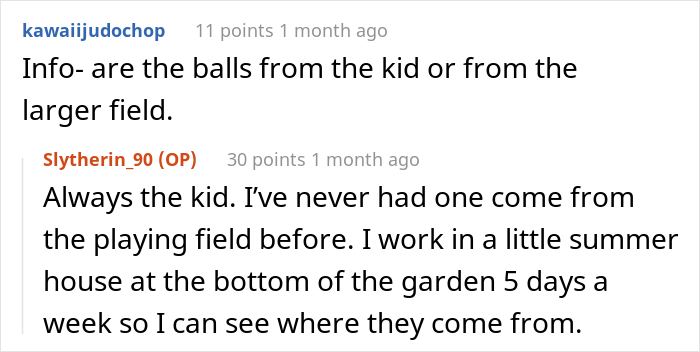
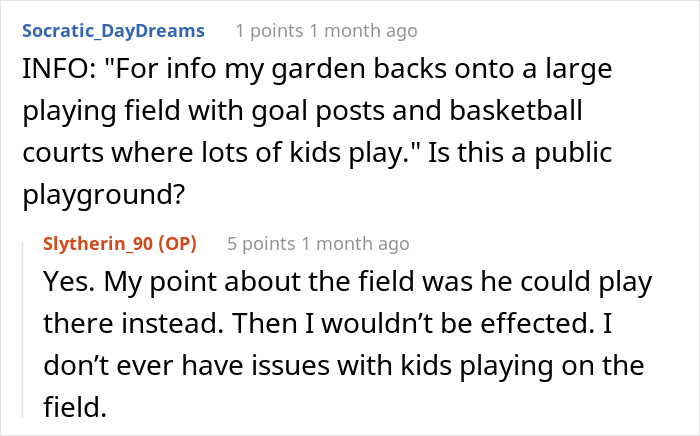
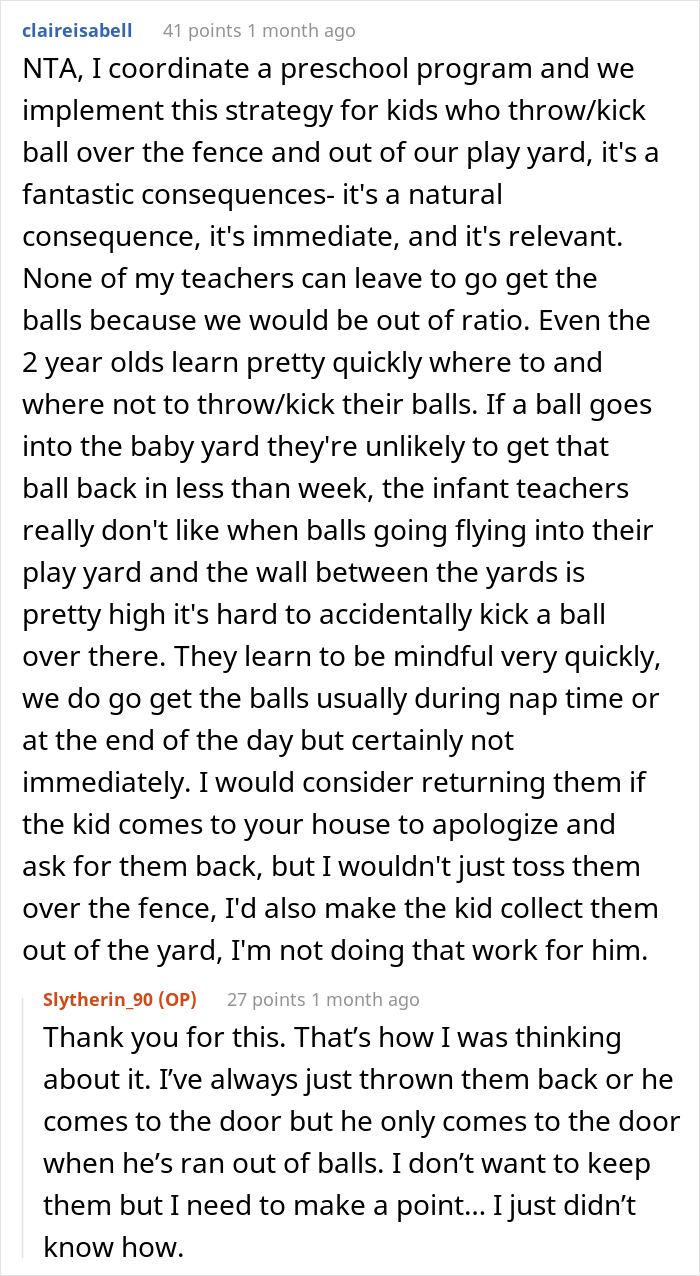


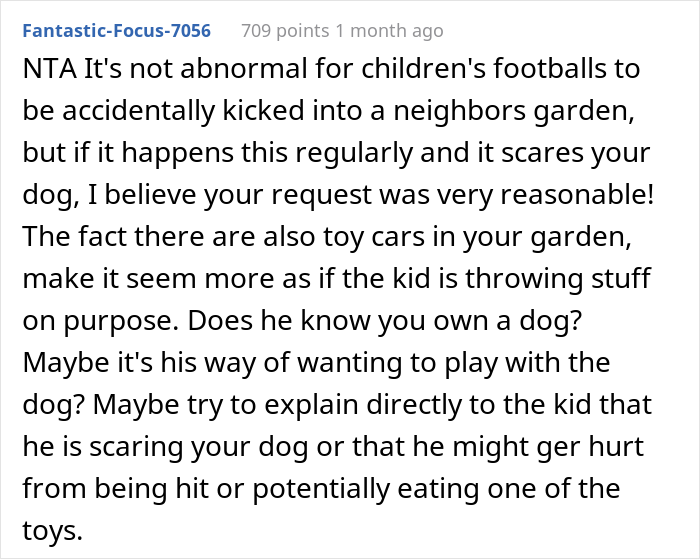


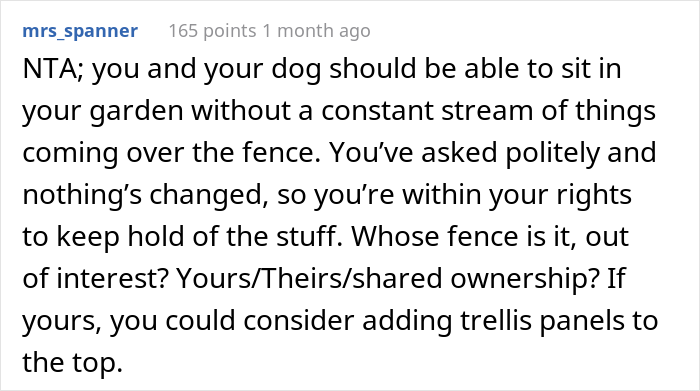

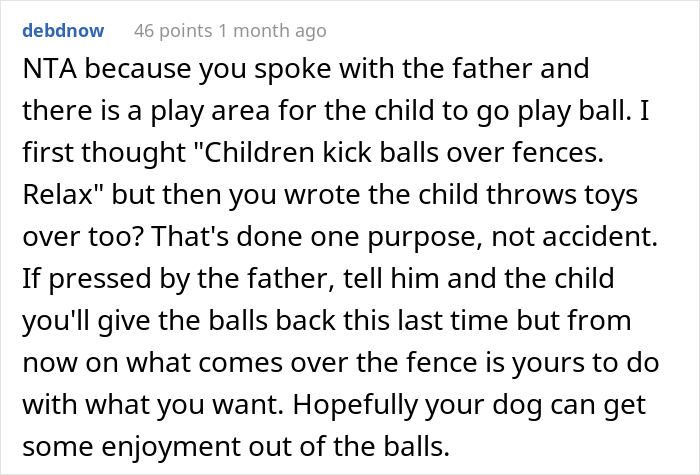
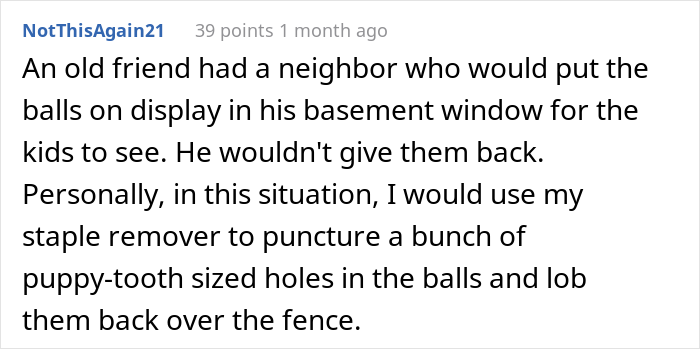










127
125